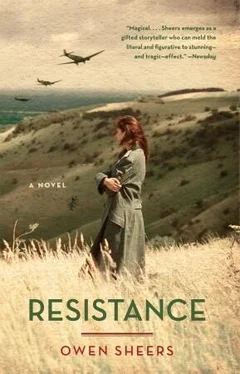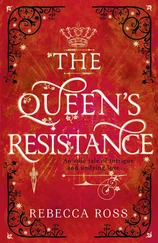She couldn’t take her eyes off the case. It was a rigid box covered in dark leather, battered and scratched with use. Her mind raced to wild possibilities as to what it might contain. This was the first time the captain had called on her since he’d carried those ewes back from the field with his sergeant at the start of the winter.
She looked up at his face. He seemed lighter, younger than he’d appeared on that day.
“Cwtch ci!” she shouted at Seren over his shoulder. The bitch sank back on her haunches, the links of her chain playing a brief scale on the cobblestones of the yard.
She looked back at Albrecht. “I s’pose so,” she said and stepped back from the door to let him in.
Albrecht walked through into the kitchen. He still wore his uniform, threadbare at the elbows and knees. The collar of his shirt was broken and frayed. Over the winter some of the other members of the patrol had begun mixing their uniforms with clothing they’d found in The Court. At first Albrecht was worried about this, thinking it would offend the women’s memories of their husbands. But Maggie had put his mind at rest. “Jus’ clothes, aren’t they?” she’d said. “Jus’ clothes. An’ your boys need to keep warm, fair enough.” Then she’d snorted a strange half-laugh. “I saw them the other day, mind,” she said, shaking her head. “Looked like a bloody bunch of refugees, they did. Right old mishmash of stuff they had on.”
Albrecht had laughed with her, relieved and relaxed by her response. “Well, maybe that’s just what we are, Mrs. Jones,” he’d said, “all of us here. Refugees.”
Her look had cut him dead. “Oh no, Captain Wolfram,” she’d said, all humour pared from her tone. “This is our home. This is where we live. We’re not refugees from anything, an’ don’t you forget that.”
Albrecht placed the leather case on the kitchen table. “I hope you don’t mind,” he said, flicking two steel latches and lifting the lid. “But I wanted to bring you this.”
Sarah looked down at the gramophone on the table. “Why?”
“Because it is your birthday today.”
It was true. It was her birthday, however much she’d tried to forget it. She hadn’t mentioned it to any of the other women and she’d tried not to even mention it to herself. There was, she felt, nothing to celebrate. Twenty-seven years old. Childless. Abandoned in a world gone sour. Just the afternoon before she’d ridden Bess up on the hill and watched a pair of crows circle and dance about each other in the air. When they’d landed they’d rubbed shoulders and Sarah had felt again, as if for the first time, the pain of her solitude. Even the carrion crows who ate the eyes of her dead ewes had companionship, while she, as ever, had just the blood pulse of the wind in her ears and the heat of Bess’s neck to keep her company. Not for the first time, she’d wanted Tom dead. Not because of what he’d done, but instead of what he’d done. In death he would have given her an answer. She would have known where he was. As it was, she just had nothing. Even the women whose husbands had gone to war, they’d always had something: letters, days of leave.
She’d once seen a crowd of these women down at the station in Pandy. They were wearing their best dresses, their cheeks rouged and their lips bright red, waiting for a train to take them into Newport. There, they would wait on the platform for the fast train carrying troops from the training fields of west Wales up to London and the ports of the south coast. The train didn’t stop at Newport, just gave a couple of blasts on its whistle and steamed on through. But these women always went to watch it pass, dressed as if for a dance. Just for the chance of seeing the faces of their husbands, their lovers, as the long line of carriages clattered and rushed past them trailing its heavy plume of steam. It was often a hopeless journey, but the women still went, just for that chance, that glimpse. But Sarah didn’t even have that. There was nowhere she could go in the hope of seeing Tom. No reports she could read with her heart in her mouth. And no letters she could wait for. Just an empty vigilance for some sign, some hidden message, and her long rides up on the hills, forever facing up to their blank answer.
Sarah sat down at the kitchen table. “Who told you that? That it was my birthday?”
“No one,” Albrecht said, slipping a black vinyl disc from a sleeve on the inside of the gramophone’s lid. “I read it in your Bible,” he said more quietly, aware that mention of that day would unsettle her, when right now he wanted nothing more than to make her glad he was there.
He busied himself at the gramophone, taking the small crank from out of its clip in the box and fitting it to the square bolt at the back. He began winding, slowly at first, then quicker, talking to Sarah as he did.
“You have no music here,” he said with his back to her. “I thought you might like some.”
Sarah didn’t reply. Her head was bent to the table as she traced the knots and whorls in the wood with her finger. She felt awkward in his presence, remembering the last time he’d stood in this kitchen, the veil of his thumbprint across her bride’s face. Albrecht was determined, however. In the past two weeks spring had come to the valley, and with it his senses had returned. It was as if he’d never experienced a change of seasons before. Bare stone walls revealed purple crocuses along their jagged tops, the birdsong multiplied, the melodies of song thrushes and blackbirds shot through with the sudden drilling of a woodpecker. He felt lighter than he had ever done, possessed of a quick, fragile potential. The turning within himself he’d first detected on those early walks through the valley was complete. He’d unlocked, and in doing so had woken another part of himself too. As if waking from a deep sleep into a clearer light of reality, he’d found himself thinking of Sarah every day.
For the past months he and his patrol had regularly listened to the Oxford professor’s gramophone and records. The music had stilled them. At times it had lifted them too. Now Albrecht wanted Sarah to experience this. More importantly, he wanted to share the experience with her. Not for the music, but for the sharing, for the creation of a common ground between them. A common ground that was not a consequence of war, but was in spite of it.
Albrecht lifted the polished steel arm and lowered the heavy stylus to the revolving record. The needle met the groove with a sudden crackle and hiss.
“Bach,” he said simply as he stepped back from the table and leant against the windowsill, folding his arms in anticipation. “The Cello suites. No. 4.”
He lowered his head and at the same time, as if his movement had created it, a bow drew itself deeply across a single bass string before melting to a higher note that fell back towards the first. At the end of that descent, the bow drew across the bass string again, ricocheting the notes higher once more to repeat the movement, the same as the first, but different too. Each time the bow pulled across that bass string, brief and sonorous, a scattering of breadcrumbs on the table near Sarah’s hand vibrated over the wood.
Sarah’s kitchen had not heard music for months. Before all this happened she used to sing to herself as she worked in here, cleaning the grate or peeling potatoes. Each chore was lightened and quickened by song, a hymn hummed or sung just under her breath. But since Tom’s leaving she hadn’t sung to herself again. With this record, with the sound of this single cello emanating from a battered leather case, everything in the room, the table, the dresser, the range, the horseshoe over the door, seemed in contact with a new element. The trees she could see through the window over Albrecht’s shoulder now moved not with the buffeting wind as before, but under the command of the rise, fall, and procession of the music.
Читать дальше












